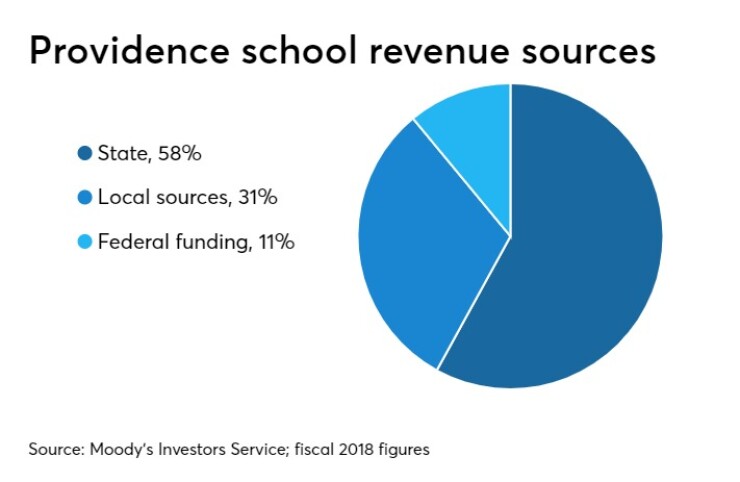Rhode Island’s takeover of the struggling school system in Providence is a credit positive for the capital city, according to Moody’s Investors Service.
“Improvement of Providence's failing school system would contribute to the city's tax base growth and economic activity,” Moody’s said in a commentary on Monday. “A weak educational system generally has adverse social effects, making a city a less desirable place to live and less attractive to businesses.”

Last week, state education Commissioner Angélica Infante-Green issued a final order announcing the Department of Education’s takeover of the Providence Public School District, effective Nov. 1. It follows a Johns Hopkins University
The report said that 90% of students across all grade levels are not proficient in math, and 86% are not proficient in English language arts. “The great majority of students are not learning on, or even near, grade level,” Johns Hopkins said.
Johns Hopkins also found that “with rare exception, teachers are demoralized and feel unsupported,” and that many school buildings are deteriorating across the city, some even dangerous to students’ and teachers’ well-being.
State voters last November overwhelmingly approved a $250 million school construction bond issue, making infrastructure improvements available for Providence and other schools. One year earlier, a school building
Moody’s, citing the district’s growth in recent years in both enrollment and per-pupil spending, said a funding shortage “is not at the heart” of the district’s challenges.
Rhode Island’s Crowley Act empowers the education department to assume budgetary, governance and personnel control of deficient school districts. The state moved to control the Providence system in August.
Infante-Green, a New York City native and former South Bronx schoolteacher, rose to become New York State's deputy education commissioner before coming to Rhode Island in late April. She is crafting a recovery plan for the Providence schools and the state expects to appoint a turnaround superintendent within weeks.
The state’s control of the school system will not immediately affect Providence’s financial condition, according to Moody’s. “However, robust state oversight of schools is typically credit positive for local governments, providing a stabilizing presence and financial assistance in some cases.”
Moody’s rates Providence Baa1 with a stable outlook. The city’s financial position is unstable, said Moody’s, but it has benefited in recent years from an expanding tax base and downtown development.
In fiscal 2018, 58% of the school district’s revenue was from the state, 31% from local sources and 11% from federal funding.
Providence is the second Rhode Island school district under state control.
The state has controlled the Central Falls district since 1993, when it could not meet its financial obligations without state funding.
Although the city of Central Falls, which filed for Chapter 9 bankruptcy in August 2011 and exited 13 months later, provides no operational support for the district, it remains an obligor for school-related debt and receives significant state aid.





